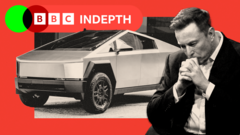Amid tensions surrounding Elon Musk's political involvement, Tesla grapples with declining sales and growing competition, questioning its future strategies and leadership as consumer sentiment shifts.**
The Complex Future of Tesla: Political Polarization and Market Challenges**

The Complex Future of Tesla: Political Polarization and Market Challenges**
As Tesla faces increasing scrutiny over Elon Musk's political actions and the pressure of emerging competition, the automaker's growth trajectory appears to be at a crossroads.**
In recent weeks, Tesla has found itself entangled in a complex web of controversies and challenges, driven in part by its prominent CEO, Elon Musk. "This has been our family car for three years, and it has been an absolute dream," says Tesla owner Ben Kilbey, who now plans to sell his Model Y in response to Musk's polarizing actions, including his recent involvement in government affairs and political rallies.
Kilbey represents a growing backlash against Musk, particularly after his appointment to head the Department for Government Efficiency (DOGE), a position associated with severe cuts to federal spending. This controversy has sparked protests outside Tesla dealerships across the globe, with reports of vandalism and hostility towards Tesla cars, especially the Cybertruck, which has become a focal point for anti-Musk sentiment.
Musk has publicly condemned the violence against Tesla properties, stating, "This level of violence is insane and deeply wrong." Yet the extent of how his political stances affect Tesla's brand image and sales remains uncertain, leading to questions about whether Musk can continue to steer the company successfully amidst these headwinds.
Founded as a small startup in the early 2000s, Tesla has transformed into the preeminent electric vehicle manufacturer globally. However, despite its status as a market leader, Tesla reported a decline in overall sales for the first time in over ten years and ongoing challenges in major markets, particularly in Europe. Analysts are concerned that Tesla's brand power might be waning as consumers reassess the company in light of Musk's actions.
The brand has also faced criticism as its product lineup appears stale compared to new entrants in the electric vehicle market. Traditional automakers have ramped up their EV offerings, and newer Chinese companies have rapidly ascended due to affordability and improved technology. The threat posed by manufacturers like BYD, who have developed advanced charging capabilities, further complicates Tesla's competitive standing.
Amid Musk's focus on ambitious projects like autonomous robotaxis—despite past unfulfilled promises—analysts assert that Tesla's leadership might require revitalization. The prevailing sentiment among some investors leans toward appointing a new CEO who could concentrate on the company's core automotive business and mitigate the effects of Musk’s political engagement.
While Musk's current influence remains formidable, calls for change within Tesla are mounting. With the electric vehicle sector evolving quickly, Tesla's ability to adapt and innovate could be essential for its continued leadership in the marketplace. As the company navigates this tumultuous landscape, stakeholders ponder the implications of recent developments on Tesla's path forward.
Kilbey represents a growing backlash against Musk, particularly after his appointment to head the Department for Government Efficiency (DOGE), a position associated with severe cuts to federal spending. This controversy has sparked protests outside Tesla dealerships across the globe, with reports of vandalism and hostility towards Tesla cars, especially the Cybertruck, which has become a focal point for anti-Musk sentiment.
Musk has publicly condemned the violence against Tesla properties, stating, "This level of violence is insane and deeply wrong." Yet the extent of how his political stances affect Tesla's brand image and sales remains uncertain, leading to questions about whether Musk can continue to steer the company successfully amidst these headwinds.
Founded as a small startup in the early 2000s, Tesla has transformed into the preeminent electric vehicle manufacturer globally. However, despite its status as a market leader, Tesla reported a decline in overall sales for the first time in over ten years and ongoing challenges in major markets, particularly in Europe. Analysts are concerned that Tesla's brand power might be waning as consumers reassess the company in light of Musk's actions.
The brand has also faced criticism as its product lineup appears stale compared to new entrants in the electric vehicle market. Traditional automakers have ramped up their EV offerings, and newer Chinese companies have rapidly ascended due to affordability and improved technology. The threat posed by manufacturers like BYD, who have developed advanced charging capabilities, further complicates Tesla's competitive standing.
Amid Musk's focus on ambitious projects like autonomous robotaxis—despite past unfulfilled promises—analysts assert that Tesla's leadership might require revitalization. The prevailing sentiment among some investors leans toward appointing a new CEO who could concentrate on the company's core automotive business and mitigate the effects of Musk’s political engagement.
While Musk's current influence remains formidable, calls for change within Tesla are mounting. With the electric vehicle sector evolving quickly, Tesla's ability to adapt and innovate could be essential for its continued leadership in the marketplace. As the company navigates this tumultuous landscape, stakeholders ponder the implications of recent developments on Tesla's path forward.




















